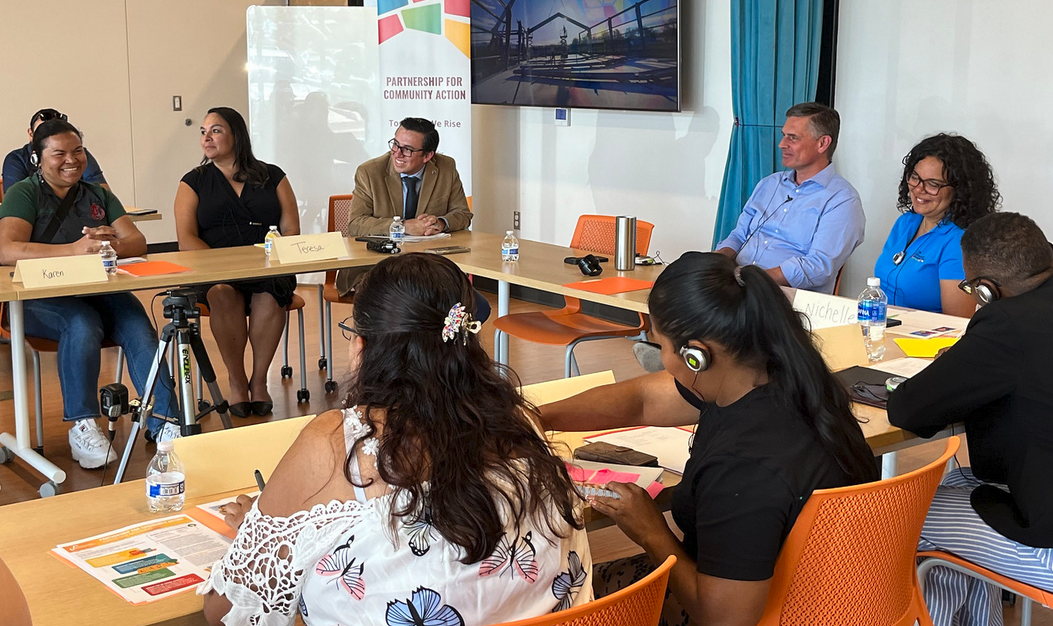It starts here
Dear Friend,
When we talk about building a better future for working families and growing New Mexico’s economy, it starts with our childcare centers and preschools.
This week, I sat down with childcare providers and early educators at the Partnership for Community Action (PCA) in Albuquerque’s South Valley to see firsthand how $250,000 I secured in the most recent government funding law is helping to improve education, health, and economic opportunities.
I hope you can take a moment to read about our discussion in the Santa Fe New Mexican story below.
PHOTO: U.S. Senator Martin Heinrich meets with early childhood educators and childcare providers at the Partnership for Community Action in Albuquerque’s South Valley to discuss the Quality Child Care Matters Program, July 15, 2024.
Ten years ago, I became the first member of the New Mexico Congressional Delegation to publicly support the proposal to tap into our state’s Land Grant Permanent Fund to expand early childhood education and care throughout our state. I was proud to stand with childcare advocates and New Mexico voters, who were able to move this proposal forward in the Legislature and at the ballot box in 2022.
In Congress, I led the successful effort to pass the New Mexico Education Enhancement Act, which granted federal approval of the state’s constitutional amendment, unlocking investments from the Land Grant Permanent Fund for early childhood and K-12 public education.
Thanks to the investments we’ve unlocked, New Mexico is leading the nation in the effort to make high-quality early childhood education and care more accessible to all of our families. But we all know that more work needs to be done to continue building a strong economy that works for all New Mexico families.
I am committed to doing that work.
Sincerely,
Heinrich: After landmark investments, state must build out child care system
By Esteban Candelaria ecandelaria@sfnewmexican.com July 15, 2024
U.S. Sen. Martin Heinrich listens as Michelle Gilbert, executive director of Partnership for Community Action, discusses investments in early childhood education during a roundtable discussion Monday, July 15, 2024. Luis Sánchez Saturno/The New Mexican
ALBUQUERQUE - As a single mother, Noelani Charley, 21, struggled to provide her children with the care they needed.
Her 4-year-old son, who has autism and struggles with speaking to others, needed specialized care, which Charley said she struggled to get as she juggled school, work and caring for her other child.
“It was very challenging ... in how I can help my children develop and how I can be able to make a livable wage and take care of them at the same time,” she told The New Mexican.
After two years of bureaucratic back-and-forths, Charley said she finally was able to enroll her boy in therapeutic services, which she said was thanks to expanded access afforded by New Mexico’s increased investments in early childhood care.
On Monday, Democratic U.S. Sen. Martin Heinrich sat down in Albuquerque with parents like Charley and community providers to discuss New Mexico’s recent investments in the field and the effect they’ve had in expanding access to families.
At the forefront of that conversation was New Mexico’s landmark investment in early childhood care and education through voters’ approval in 2022 of a constitutional amendment that called for annual distributions from the Land Grant Permanent Fund for early childhood programs.
Earlier this year, the Legislative Finance Committee projected the fiscal year 2025 end balance for New Mexico’s new Early Childhood Trust Fund would be over $9 billion. Lawmakers this year also approved a nearly $95 million increase in the distribution from the trust fund each year, raising the amount sent to the Early Childhood Education and Care Department to about $250 million annually.
With the state’s increased investments, Heinrich said New Mexico now must build out its early childhood care and education framework.
“We have to figure out how to scale this, and how we can support your workforce development, your training, all the things that will allow the impact of this to not just be where we are today, but to really grow over time,” Heinrich said.
Some providers told Heinrich the state needs to work on improving wages for early childhood employees.
Valeria Holloway, who owns and operates Las Cruces-based day care Best of the Southwest, said she can only afford to pay her employees around $16 per hour.
After increases in recent years from the state, starting pay for early childhood workers is about $15 per hour. But that number still isn’t high enough, Holloway said.
“I want to get them to a livable wage. And I can’t do that because I’m not making enough to spread it all around,” she told The New Mexican.
While it’s unclear how it would affect child care workers’ wages, Heinrich pointed to legislation he has co-sponsored aimed at lowering child care costs for working families. According to a news release, the legislation would increase child care tax credits to around $4,000.
“We do need to bring some more resources to bear and I think a federal child care tax credit is one way to get at that, especially for economically challenged communities,” he said.


